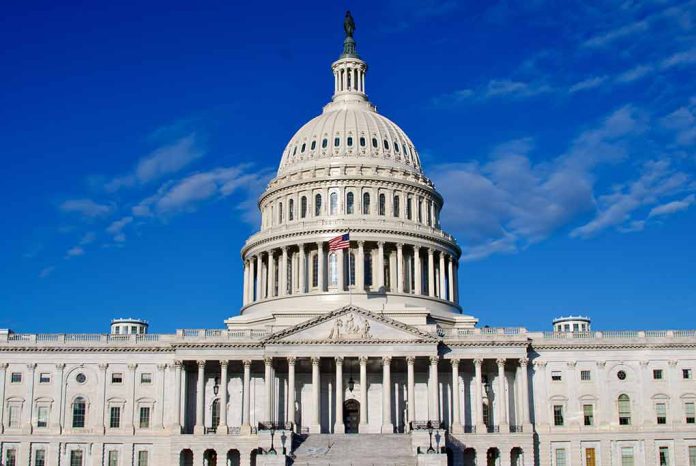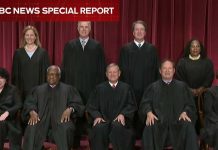
Ben Cohen, co-founder of Ben & Jerry’s ice cream, was forcibly dragged out of a Senate hearing while shouting “Congress pays for bombs” during HHS Secretary Robert F. Kennedy Jr.’s testimony, highlighting the growing and unexpected intersections between progressive activists and conservative figures in American politics.
Key Takeaways
- Ben Cohen, 74, was among seven protesters arrested for disrupting RFK Jr.’s Senate testimony, with protesters chanting “RFK kills people with hate!”
- The ice cream mogul’s arrest comes amid his criticism of U.S. support for Israel, claiming Congress is “killing poor kids in Gaza by buying bombs” while cutting Medicaid for American children.
- This incident reflects a broader trend of unusual political realignments where some progressive figures are finding common ground with conservatives on issues like government overreach and foreign policy.
- Conservative commentators Glenn Beck and Stu Burguiere question whether these new alliances represent principled common ground or if conservatives are compromising their values.
- Cohen’s protest ironically targeted RFK Jr., who likely shares some of his anti-establishment views, demonstrating the complex and shifting nature of today’s political divides.
Progressive Ice Cream Mogul’s Senate Hearing Meltdown
The Senate HELP Committee hearing on May 14, 2025, descended into chaos when Ben Cohen and fellow protesters disrupted proceedings during Health and Human Services Secretary Robert F. Kennedy Jr.’s opening statement. Video footage captured the 74-year-old ice cream company co-founder being forcibly removed by Capitol Police after shouting criticisms of congressional funding for military operations abroad. Committee chairman Senator Bill Cassidy was forced to pause the hearing, later dismissing the dramatic scene as “a made-for-C-SPAN moment” while ordering the removal of all disruptive individuals from the chamber.
Cohen was one of seven protesters arrested on charges of “crowding, obstructing or incommoding,” with some facing additional charges of resisting arrest and assaulting a police officer. This marks Cohen’s second arrest for protest activities in recent years, following a 2023 incident outside the Department of Homeland Security. The Ben & Jerry’s co-founder later shared a video on his social media account explaining his motivations, directly connecting domestic spending cuts with foreign military aid in a message aimed at his progressive followers.
Cohen’s Anti-War Activism and Corporate Political History
In the aftermath of his arrest, Cohen took to social media to clarify his protest message. “I told Congress they’re killing poor kids in Gaza by buying bombs, and they’re paying for it by kicking poor kids off Medicaid in the US,” Cohen stated from his X account, doubling down on his criticism of U.S. policy regarding the Israel-Hamas conflict in Gaza. His direct linking of foreign aid to Israel with domestic spending cuts reflects the growing leftist criticism of the Biden administration’s support for Israel, particularly among progressive activists who have increasingly adopted anti-Israel positions.
“That was a made-for-C-SPAN moment,” Sen. Bill Cassidy remarked as officers removed the protesters from the hearing room.
Ben & Jerry’s has maintained an activist corporate stance even after being acquired by Unilever in 2000, with the company’s social justice positioning frequently drawing Republican criticism. In 2021, the company made headlines by halting ice cream sales in the West Bank, which it referred to as “Occupied Palestinian Territory.” This political activism has made the company both a darling of the progressive left and a target for conservatives who oppose mixing business with leftist political agendas, contributing to the ongoing polarization of American consumer brands.
Strange New Political Bedfellows
The irony of Cohen’s protest targeting RFK Jr. has not been lost on political observers. As noted by commentator Stu Burguiere on “The Glenn Beck Program,” RFK Jr. might actually share many of Cohen’s views on government overreach and military interventionism. This peculiar situation highlights the complex realignments occurring in American politics, where traditional partisan divisions are increasingly giving way to issue-specific alliances that cross conventional boundaries. Cohen’s recent appearance on Tucker Carlson’s program further illustrates this phenomenon of unlikely political partnerships forming around specific issues.
“The Glenn Beck Program” host Stu Burguiere observed that Cohen was protesting against RFK Jr., who might actually agree with Cohen on the issue, highlighting the ironic nature of the protest.
Glenn Beck and Stu Burguiere pointed to Tulsi Gabbard as another example of this political realignment, noting her journey from supporting democratic socialist Bernie Sanders to aligning with the MAGA movement. However, Burguiere expressed concern that these new alignments might not represent conservatives winning converts but rather indicate a troubling shift where conservatives are abandoning their principles in favor of leftist views on military intervention and government authority. Beck countered that this trend may simply reflect conservatives becoming more aware of certain issues that transcend traditional partisan divides.
The Future of Political Activism and Free Speech
Cohen’s arrest raises important questions about free speech and protest rights in America, particularly in the context of congressional hearings. While disrupting official government proceedings clearly crosses legal boundaries, the incident highlights the ongoing tension between maintaining order in democratic institutions and protecting the right to express dissent. As Glenn Beck noted, there is a certain irony in watching those who once complained about being silenced now attempting to silence others, suggesting a troubling pattern where principles of free expression are increasingly subordinated to partisan goals.
“I told Congress they’re killing poor kids in Gaza by buying bombs, and they’re paying for it by kicking poor kids off Medicaid in the US,” Ben Cohen declared in his social media statement following the arrest.
As America moves forward under President Trump’s leadership, incidents like Cohen’s protest illustrate the continuing challenges of navigating complex policy issues in a deeply divided political landscape. Whether these unusual political alliances represent a genuine opportunity for bipartisan collaboration or merely signal more cynical tactical maneuvering remains to be seen. What is clear is that traditional political categories are increasingly insufficient to describe the complex web of agreements and disagreements that characterize modern American politics, with figures like Cohen and RFK Jr. defying simple partisan classification.







